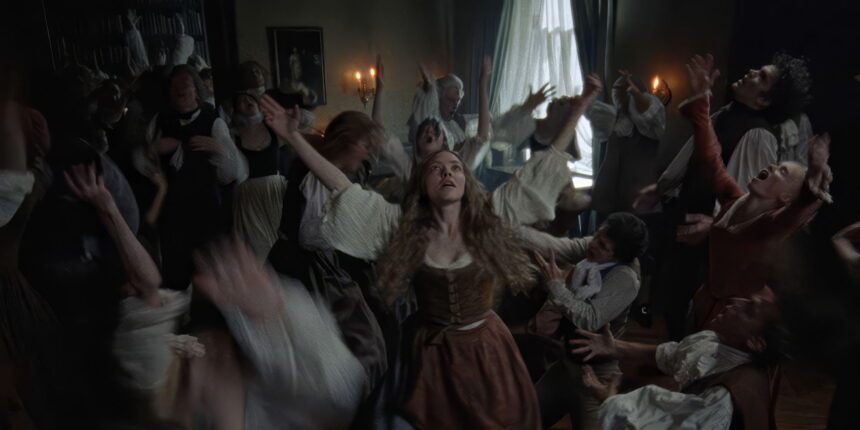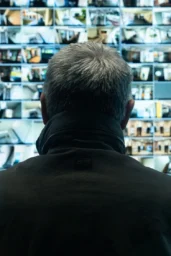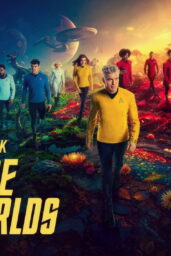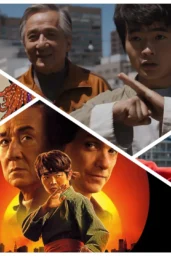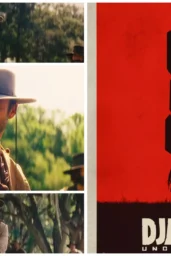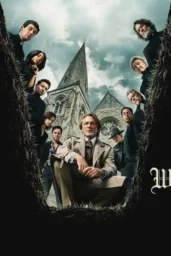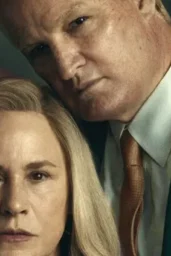The first image from The Testament of Ann Lee looks like something pulled from a fevered dream or an abandoned fresco: Amanda Seyfried in full period garb, swathed in divine light, surrounded by motionless followers like a living iconography class. But this isn't just aesthetic indulgence. It's the first formal strike from a film that's shaping up to be one of the more peculiar swings at Venice 2025—and possibly the strangest musical since Jesus Christ Superstar.
Directed by Mona Fastvold and co-written with her longtime collaborator and partner Brady Corbet, Ann Lee has secured slots at both Venice and TIFF this fall, screening in 70mm no less. A bold move in an era where streaming algorithms can barely handle subtitles, let alone celluloid. At 137 minutes, the film is being positioned not as a modest indie drama, but as an “epic fable”—the kind of phrase that used to mean something before every studio press kit started abusing it.
Here, it actually might.
Seyfried plays Ann Lee, the real-life founder of the Shaker movement who, in the 18th century, claimed to be the female incarnation of Christ. Not your average jukebox setup. The role sees Seyfried return to the kind of off-center, risk-prone work she should've been doing more of post-First Reformed. According to her, the experience was—as she puts it—“really crazy.” One hopes that's the kind of crazy worth watching.
There's also the matter of it being a musical. That word's doing a lot of heavy lifting lately. For every Dancer in the Dark, there's a dozen soulless “song cycles” trying to pass as cinema. But Fastvold doesn't strike me as the kind to toss in a number just for the hell of it. Her previous work (The Sleepwalker, The World to Come) is marked by a kind of elegant unease—slow burns with emotional rigor and visual poise. If she applies that same restraint to the musical format, we may be in for something rare: a stylized period film that actually earns its strangeness.
No word yet on whether the film was shot in VistaVision, as Corbet's The Brutalist was, but Ann Lee will screen in glorious 70mm. Which tells you one thing right away—this isn't built for your phone. It's a gesture of scale. Of commitment. And in today's industry, that's almost rebellious.
Then there's the team. Corbet, stepping back from directing duties this time, has co-written all three of Fastvold's features, and she's co-written all three of his—The Childhood of a Leader, Vox Lux, and The Brutalist. Call it what you want—symbiosis, co-dependence, cosmic irony—but there's no denying they're one of the most consistently ambitious pairs in the indie circuit. They don't make crowd-pleasers. They don't make noise for the sake of attention. They just make things.
Backing Seyfried is a strong cast: Thomasin McKenzie, Lewis Pullman, Christopher Abbott, Tim Blake Nelson, and Stacy Martin. That's not a red carpet; that's a bench of actors who know how to simmer. Each one capable of playing belief, doubt, and delusion without blinking. Which, considering the film's premise, may be essential.
And yet what's most promising here isn't the cast, or even the premise—it's the tone. You can fake spectacle. You can fake emotion. But you can't fake conviction. And this project, from what little we've seen and heard, appears soaked in it.
There's a line between artistic bravery and cinematic suicide. Sometimes, Fastvold and Corbet toe that line. Sometimes they cross it. But better that than the endless middle.
We'll see where Ann Lee lands when it premieres at the Venice Film Festival in early September 2025, with a TIFF screening to follow shortly after. Until then, that strange, glowing still will have to suffice—a frozen hymn from a film that might just demand to be sung.

